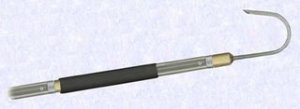In honor of the 2008/09 Alaskan King Crab fishery that opened this past week on October 15th, I find myself once again contemplating the fishers of the now famous (due largely to the popularity of reality television) commercial crab-fishing industry. In my world, most of these men, along with the occasional women that would hazard the risk, were already famous – some infamous in their own right – but all definitely bestowed with a certain level of respect that defined them as original heroes and pioneers of the commercial fishing industry.
As a young girl participating in the typical commercial fisheries of Southeast Alaska, there was very limited contact with the Western Alaskan fishers of the crabber variety – except when some crab boats doubled as herring tenders for the annual spring Sitka Sac Roe Herring fishery. Over the years, I have come to know skippers, engineers, deckhands, permit-holders, pilots, and the entire entourage of folks affiliated with the crabber-tender industry; and while I ain’t particularly bragging, I certainly ain’t complaining.
I was once privy to a conversation occurring between a crew of men bellied up to my bar discussing various gaffing techniques should one of them go overboard.
“I ‘spose in the ass-cheek. That would be best,” proclaimed one salty dog to no one in particular.
“No, no!” shouted his buddy, “In the left shoulder, below the cuff. That way I could get some time off, some Fisherman’s Fund, and be healed up in time for salmon season.”
“Do it in my leg,” his mate interjected. “I need to keep my hands free for tipping beers and holding beautiful women.”
Laughter. “Yeah, like any babes are gonna wanna do your sorry ass if you ain’t made no money!” said another.
“Fuck you all,” the skipper chimed in. “Anyone goes overboard when we are in the crab, you’re shit outta luck!”
More laughter and then a pregnant moment of silence. I set up another round of drinks and tipped one back with them. No one asked me where I might want to be gaffed, and I realized then and there, that no matter how much a part of their lives I might be, their comradeship was virtually unfathomable and impenetrable by anyone who had not ever experienced the life of the crab fisherman. And I was okay with that.
It is enough to have these people pass through our lives, to enrich our experiences, and to remind us of how incredibly significant our impact is when we meet them. Here’s the thing, though, these boys are uniquely tough bastards. Year after year these men continue living out of impersonal little duffel bags, carrying photos of friends, lovers, kids back home. When not hard at work, they are often hard at play: doing dope, skipping rope, howling at the moon… Anything to blow off steam, kill the fear and frustration.
The unpredictable nature of the Bering Sea crab fisheries is such that you never know when you might see these friends again; yet, there are no regrets. They choose this life, not only for the adventure, the danger, the tradition, but also for the money and the glory. The incredible wages earned along with the confident swagger acquired by knowing that they are quite possibly the last of a dying breed that are working in the world’s most dangerous profession.
I never did consider where I might wish to be gaffed, and happily, I have never come to regret that silent indecision.
